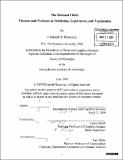The rational child : theories and evidence in prediction, exploration, and explanation
Author(s)
Bonawitz, Elizabeth R. (Elizabeth Robbin)
DownloadFull printable version (33.06Mb)
Other Contributors
Massachusetts Institute of Technology. Dept. of Brain and Cognitive Sciences.
Advisor
Laura Schulz.
Terms of use
Metadata
Show full item recordAbstract
In this thesis, rational Bayesian models and the Theory-theory are bridged to explore ways in which children can be described as Bayesian scientists. I investigate what it means for children to take a rational approach to processes that support learning. In particular, I present empirical studies that show children making rational predictions, exploration, and explanations. I test the claim that differences in prior beliefs or changes in the observed evidence should affect these behaviors. The studies presented in this thesis encompass two manipulations: in some conditions, children's prior beliefs are equal, but the patterns of evidence are varied; in other conditions, children observe identical evidence but children's prior beliefs are varied. I incorporate an additional approach in this thesis, testing children within a variety of domains, tapping into their intuitive theories of biological kinds, psychosomatic illness, balance, and physical systems. Chapter One introduces the problem. Chapter Two explores how evidence and children's strong beliefs about biological events and psychosomatic illness influence their forced-choice explanations in a story-book task. Chapter Three presents a training study to further investigate the developmental differences discussed in Chapter Two. Chapter Four looks at how children's strong differential beliefs of balance interact with evidence to affect their predictions, play, explanations, and learning. (cont.) Chapter Five looks at children's exploratory play with a jack-in-the-box, (where children don't have strong, differential beliefs), given different patterns of evidence. Chapter Six investigates children's explanations following theory-neutral evidence about a mechanical toy. Chapter Seven concludes the thesis. The following chapters will suggest that frameworks combining evidence and theories capture children's causal learning about the world.
Description
Thesis (Ph. D.)--Massachusetts Institute of Technology, Dept. of Brain and Cognitive Sciences, 2009. Includes bibliographical references (p. 122-133).
Date issued
2009Department
Massachusetts Institute of Technology. Department of Brain and Cognitive SciencesPublisher
Massachusetts Institute of Technology
Keywords
Brain and Cognitive Sciences.